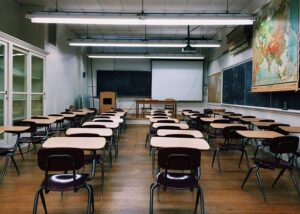Learning In Unprecedented Times: The Changing Landscape For School Law
Back-to-school season looks different (again) this year thanks to COVID-19.
 Back-to-school season looks different (again) this year thanks to COVID-19, and lawyers working in education law and policy have their work cut out for them. To learn more about the many ways the pandemic has affected this area of the law, we spoke with Jesse Cole Cutler, of the Law Offices of Regina Skyer and Associates L.L.P. and Co-Chair of PLI’s 21st Annual School Law Institute.
Back-to-school season looks different (again) this year thanks to COVID-19, and lawyers working in education law and policy have their work cut out for them. To learn more about the many ways the pandemic has affected this area of the law, we spoke with Jesse Cole Cutler, of the Law Offices of Regina Skyer and Associates L.L.P. and Co-Chair of PLI’s 21st Annual School Law Institute.
What are the top “unprecedented” issues in school law today arising from the pandemic?
Some of the most pressing issues are:
Mask mandates. The United States Department of Education (DOE) has opened an investigation of five states – Iowa, Oklahoma, South Carolina, Tennessee, and Utah – that have implemented prohibitions on universal indoor masking, due to concerns that such prohibitions put children at risk and prevent students, especially students with disabilities, from accessing in-person learning on an equal basis. Several other states have passed laws prohibiting mask mandates; however, these laws have been stayed pending judicial review. The DOE has notified school districts in these states that the federal government will provide additional federal funding and assistance if their state funding is reduced as a result of implementing mask requirements and other COVID-19-related safety protocols.
Vaccine mandates. The issue of required vaccination is one of the most polarizing to result from the pandemic. Nearly 700 schools across 25 states have not returned to full-time in-person instruction due to COVID-19 outbreaks. These students have had their school year start dates pushed back; have moved into hybrid or full-time remote instruction; and have been forced to cope with a swiftly changing landscape as more and more children are hospitalized across the country. Age-eligible student athletes are required to be vaccinated against COVID-19 in at least seven states. In many states, school faculty and staff are facing vaccination requirements, while others prospectively bar vaccination for eligible students and staff.
Remote learning. While many students returned to the classroom for at least a portion of their school week at some point during the 2020-2021 school year, many with underlying health and medical issues and those with more intense needs were unable to return on a hybrid or full-time basis. Access to technology, broadband internet, and ample workspace in the home varied widely, highlighting these issues for a number of students. Some flourished from the opportunity to learn in front of a computer at their own pace without the distraction of others in the classroom, while others wilted from the lack of in-person social interaction. The slow return to school often resulted in classrooms with fewer students and more intense and directed learning opportunities. I anticipate that the fall of 2021 will show us just how many students were able to learn appropriately in these alternative environments and where we need to direct resources in the years ahead.
How has the landscape changed over the past year for students in special education, and how can attorneys help?
We don’t yet understand fully how far-reaching the pandemic’s impact will be. However, every educator and parent can tell you that students are significantly affected by changes to instruction over the past 18 months. Perhaps no group is more impacted than those students with disabilities, who are disproportionately impacted by the abrupt changes made to instructional methodologies, settings, and their ability to access the supports and services mandated by their Individual Education Programs.
The DOE has recently clarified that, regardless of the pandemic, children with disabilities are entitled to a Free Appropriate Public Education whether they are attending school in person or virtually. This includes the “Child Find” obligation, which places an affirmative obligation on districts to identify, locate and evaluate all students with disabilities, including those simply suspected of having a disability. Insofar as a number of students have not been enrolled in schools, or have unenrolled from public schools and been enrolled in private schools or home-schooled, school districts need to adapt their Child-Find procedures. Further, many students are suspected of suffering from long COVID, or post-COVID conditions that meet the definition of a disability under the IDEA.
Why do you co-chair PLI’s Annual School Law Institute?
The 2021-2022 school year is my 19th year in the field, and I’ve seen first-hand how effective early-childhood education can change the lives of students with learning differences and disabilities. Those students with disabilities, especially those with language-based learning disabilities, Autism spectrum disorder, complex medical issues, and emotional disturbances, have long suffered from ineffective and discriminatory educational policies and practices. I recognize the need for a public and private partnership to address and remedy these practices and provide ongoing and forward-looking appropriate educational services to students with learning differences.
At the same time, I look to further the intersection of educational, psychological, and medical practices to provide appropriate educational services to all students regardless of their disability. With programs like the School Law Institute, PLI helps to support this mission, providing us with the platform and resources to give voice to the practitioners on the forefront of this young area of law and advocate for students throughout the country.
To learn more, register for PLI’s 21st Annual School Law Institute, available on-demand.







